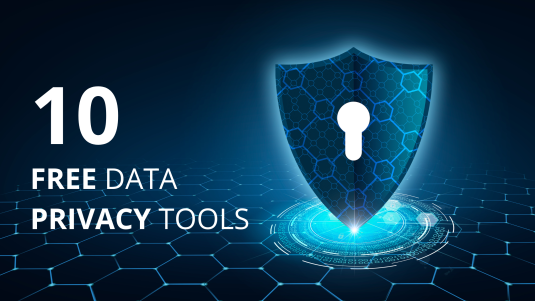Our Complete Guide to the Best 0$ Data Protection & Privacy Software

Data privacy tools are needed more than ever to help protect our personal and business data. To illustrate just how much information we are creating now, Statista estimates that around 120 zettabytes of data will be generated this year (that’s the equivalent of 120 trillion gigabytes!). But with so much data produced by each and every one of us, it’s making it more and more likely that unprotected information will be compromised.
Fortunately, there are many free data protection tools that can be used to safeguard your digital information. But, with so much choice, what applications can you trust and how should you get started? In this blog, we’ll explore 10 tools you can start using today to keep your data safe.
Data Privacy Tool 1: Password Manager
Using strong and unique passwords for each of your accounts is an essential step in securing your privacy. However, keeping track of all those passwords can be challenging. That’s where password managers come into play. Password managers securely store your passwords in an encrypted database, so you only need to remember one master password to access them all. There’s plenty of popular free options, but we recommend Password Safe, which is designed by renowned security technologist Bruce Schneier.
Data Privacy Tool 2: Browser
Some Internet browsers collect and share your personal data, such as browsing history and online behavior, with third-party advertisers and other entities. Not only does this result in your browser becoming flooded with ad-sponsored content, but it can compromise your privacy and put your sensitive information at risk. There are a few privacy-minded browsers that you can use to limit or avoid this, but Brave is widely regarded as the best browser for overall privacy. Brave is also the tool of choice when using AI services, such as ChatGPT.
Data Privacy Tool 3: Search Engine
Google may be the dominant power in search engines, but it’s one of many popular options that track your search history and use that data to bombard you with targeted advertisements. Fortunately, not all search engines collect user data. DuckDuckGo offers a case in point, as it’s a privacy-focused search engine that is a vocal supporter of users’ privacy rights. It’s getting more popular too, with daily search numbers of more than 100 million queries.
Data Privacy Tool 4: Virtual Private Network (VPN)
A VPN is a powerful and commonly used tool that protects your online privacy by encrypting internet traffic and routing it through a remote server. This makes it much harder for third parties to intercept or monitor your online activities. While there are many paid VPN services available, there are also several free options. One that’s rated very highly is ProtonVPN. Keep in mind that free VPNs often have limitations, such as data usage caps or slower speeds, but they can still be a useful tool for occasional use.
Data Privacy Tool 5: Ad Blocker
Besides being annoying, online advertisements can pose a privacy risk if they track your online activities. Fortunately, you can prevent third-party trackers from collecting your data with an ad blocker. AdBlock Plus is one of the most popular and effective ad blockers. However, some websites may require you to disable your ad blocker to access their content, so in those cases you might need to compromise on your privacy a little bit.
Data Privacy Tool 6: Windows Data Collection Blocker
Windows 10 and 11 have default settings that allow Microsoft to collect and share your device usage data – such as location, search history, and app usage – with its partners. This feature can compromise your privacy and lead to targeted advertising. To protect your privacy, you can disable data collection with BCWipe Privacy Guard, a free solution that helps ensure your sensitive data is secure and protected.
Data Privacy Tool 7: Data at Rest Encryption (Computer & Cloud)
Data at rest is data stored in a specific place that isn’t actively moving. Files on your computer hard drive, USB stick or cloud are all examples of data at rest. Unfortunately, if data at rest is left in an unencrypted form, it can be vulnerable to theft, loss or cyber-attacks. Encryption solutions provide the most effective protection for your sensitive data at rest. While there are many excellent paid options like BestCrypt, there are also free alternatives available. For small files and folders, we recommend BCArchive.
Data Privacy Tool 8: Data at Use Encryption
Data is in use when actively viewed, modified or processed by a person or program. Even if your files are encrypted while at rest, they typically exist in an unencrypted state once you open and work with them, which makes them vulnerable to cyber-attacks, ransomware and prying eyes. To protect your sensitive data in use, free software like BestCrypt Data Shelter can be used to ensure that files and folders on active computers are only accessible by authorized users and trusted programs.
Data Privacy Tool 9: Email
Some popular email providers, like Gmail, collect information about you and use it for targeted ads or other purposes. What this in mind, it’s always a good idea to carefully read the privacy policies of email services you use in order to understand what data is being collected and how it’s being used. If you’re looking for a more secure email provider, ProtonMail is widely trusted by privacy-minded users. Finally, make sure to use a tool like BCArchive to encrypt any attachments that you send.
Data Privacy Tool 10: Messenger
As for email providers, messengers can collect and share data (like chat logs and personal information) with third parties to be used in targeted advertising and elsewhere. In addition, companies that provide the service can often access everything you say, write or send. To keep your conversations secure, we suggest using Signal: a free and open-source messaging app that provides end-to-end encryption for all your communications.
But Don’t Forget…
While using free data privacy tools can do a lot to boost your protection, it’s important to recognize that they may not solve all privacy-related issues. It’s essential to understand any limitations these data protection tools may have and take additional measures to ensure your information is fully safeguarded.
As threats evolve, especially with the rise of AI-driven scams, staying ahead means broadening your defenses. For practical next steps, check out our guide on how to protect yourself from AI scams. The guide features 10 free and paid tools to help you defend against phishing, identity theft and more.
If you’re looking to improve your organization’s data protection strategy, why not check out our Guide to Enterprise Data Protection?
